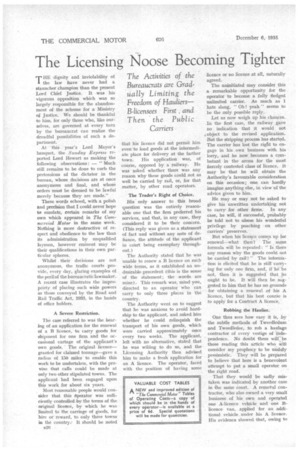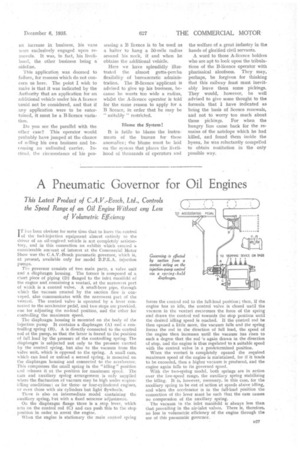The Licensing Noose Becoming Tighter
Page 40

Page 41

If you've noticed an error in this article please click here to report it so we can fix it.
THE dignity and inviolability of the law have never had a stauncher champion than the present Lord Chief justice. It was his vigorous opposition which was so largely responsible for the abandonment of the scheme for a Ministry of Justice. We should be thankful to him, for only those who, like ourselves, are governed at every turn by the bureaucrat can realize the dreadful possibilities of such a department.
At this year's Lord Mayor's banquet, the •S'unelay Express reported Lord Hewart as making the following observations: — "Much still remains to be done to curb the pretensions of the dictator in the bureau, whose _decisions are at once anonymous and final, and whose orders must be deemed to be lawful merely because they are made."
These words echoed, with a polish and precision that I could never hope to emulate, certain remarks of my own which appeared in The Commercial Motor in the same week. Nothing is more destructive of respect and obedience to the law than its administration by unqualified laymen, however eminent may be their qualifications in their own particular spheres.
Whilst their decisions are not anonymous, the traffic courts provide, every day, glaring examples of the peril of the bureaucratic lawmaker. A recent case illustrates the impropriety of placing such wide powers as those conveyed by the Road and Rail Traffic Act, 1933, in the hands of office holders.
A Severe Restriction.
The case referred to was the hearbig of an application for the renewal of a B licence, to carry goods for shipment for one firm and the occasional cartage of the applicant's own goods. The original licence— granted for claimed tonnage—gave a radius of 150 miles to enable this work to be undertaken, with the proviso that calls could be made at only two other stipulated towns. The applicant had been engaged upon this work for about six years.
Most reasonable people would consider that this Operator was sufficiently controlled by the terms of the original licence, by which he was limited to the carriage of gods, for hire or reward, to only three towns in the country." It should be noted
e2B that his licence did not permit him even to load goods at the intermediate place for delivery at the farther town. His application was, of course, opposed by a railway. He was asked whether there was any reason why these goods could not as well be carried by rail, or, for that matter, by other road operators.
The Trader's Right of Choice.
His only answer to this broad question was the entirely reasonable one that the firm preferred his services, and that, in any case, they considered it to be their concern. (This reply was given as a statement of fact and without any note of defiance, the attitude of the applicant in court being exemplary throughout.) The Authority stated that he was unable to renew a B licence on such wide terms, as it established an undesirable precedent (this is the sense of the statement; the .words, are mine). This remark was, mind you, directed to an operator who can carry to only three places in the country.
The Authority went on to suggest that he was anxious to avoid hardship to the applicant, and asked him whether he could relinquish the transport of his own goods, which were carried approximately once every two weeks. The applicant, left with no alternative, stated that he was willing to do so, and the Licensing Authority then advised him to make a fresh application for an A licence. The operator, faced with the position of having some licence or no licence at all, naturally agreed.
The uninitiated may consider this a remarkable opportunity for the operator to become a fully fledged unlimited carrier. As much as hate slang, "Oh! yeah" seems to be the only possible reply.
Let us now weigh up his chances. In the first case, the railway, gave no indication that it would not object to the revised application. But the stripping process has started. The carrier has lost the rigrit to engage in his own business with his lorry, and he now becomes a combatant in the arena for the most fiercely contested class of licence. It may be that he will obtain the Authority's favourable consideration on this occasion; one can hardly imagine anything else, in view of the advice given to him.
He may or may not be asked to give his unwritten undertaking not to carry for other firms. In any case, he will, if successful, probably be told not to abuse his wonderful privilege by poaching on other carriers' preserves.
But when his licence comes up for renewal—what then? The same formula will be repeated : "Is there any reason why the goods could not be carried by rail?" The information is elicited that he is stillcarrying for only one firm, and, if hi-be not, then it is suggested that he ought to be. It will then be suggested to him that he has no grounds for obtaining a renewal of his A licence, but that his best course • is to apply for a Contract A licence.
Robbing the Haulier.
One thus sees how easy it is, by the subtle methods of Tweedledum and Tweedledee, to rob a haulage• contractor of every vestige of independence. No doubt there wilrbe those reading this article who Will consider my prophecy to be unduly pessimistic. They will be prepared to believe that here is a benevolent attempt to put a small operator on the right road.
That they would be sadly mistaken was indicated by another case in ihe same court. A removal Contractor, who also owned a very small business of his own and operated one A-licence vehicle and one Blicence van_ applied for an additional vehicle, under his A licence. His evidence showed that, owing to
an increase in business, his vans were exclusively engaged. upon removals. It was, in fact, his livelihood, the other business being a sideline.
This application was doomed to failure, for reasons which do not concern us here. The point I wish to make is that it was indicated by the Authority that an application for an additional vehicle under his A licence 'could not be considered, and that if any application were ta be entertained, it must be a B-licence variation.
Do you see the parallel with the other case? This operator would probably have jumped at the chance of selling his own business and her oming an unlimited carrier. Instead, the circumstance of his pos sessing, a B licence is to be used as a halter to hang a 50-mile radius around Ins neck, if and when he obtains the additional vehicle.
Here we have splendidly illustrated the almost gutta-percha flexibility of bureaucratic administration. The B-licence 'applicant is advised to give up his business, because lie wants too wide a radius, whilst the A-licence operator is told for the same reason to apply for a B licence, in order that he may be " suitably " restricted.
Blame the System!
It is futile to blame the instruments of the bureau for these anomalies; the blame must be laid on the system that places the livelihood of thousands of operators and the welfare of a great industry in the hands of glorified civil servants.
A word to those A-licence holders who are apt to look upon the tribulations of the B-licence operator with pharisaical aloofness. They may, perhaps, be forgiven for thinking that this railway feast must inevitably leave them some pickings. They would, however, be well advised to give some thought to the formula that I have indicated as being the basis of licence renewals, and not to worry too much about those pickings. For when the hungry lion came back for the remains of the antelope which he had killed, and found them inside the hyena, he was reluctantly compelled to obtain restitution in the only possible way.




























































































